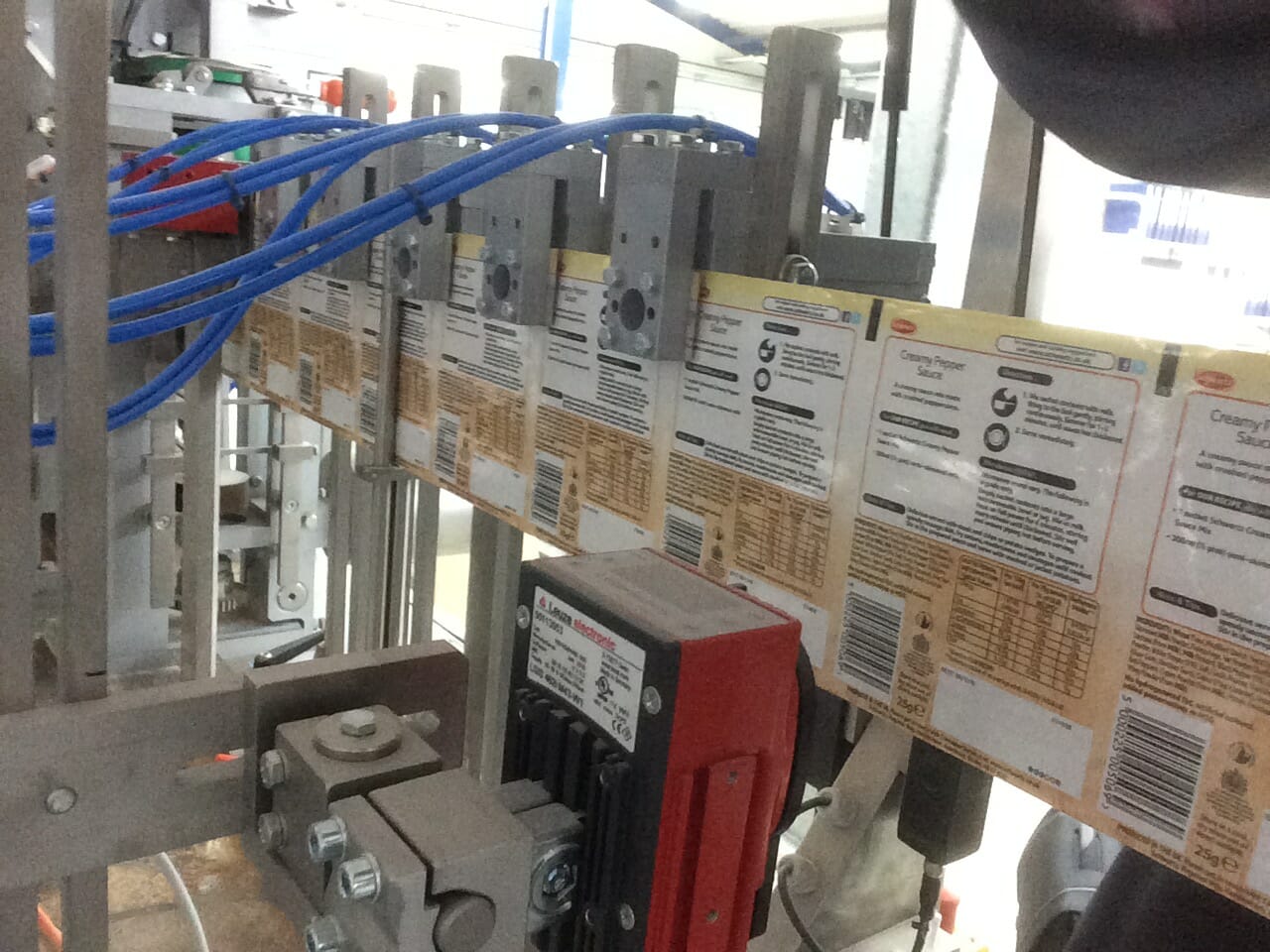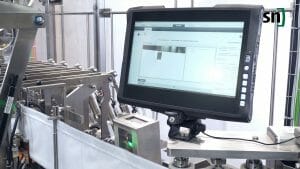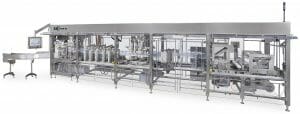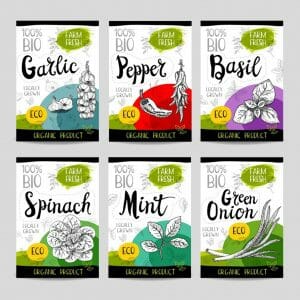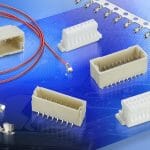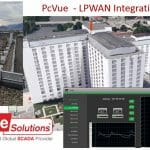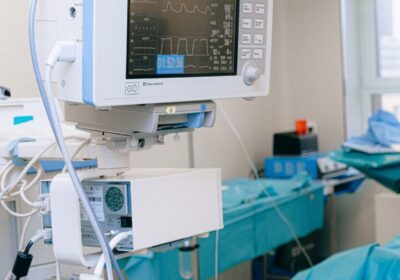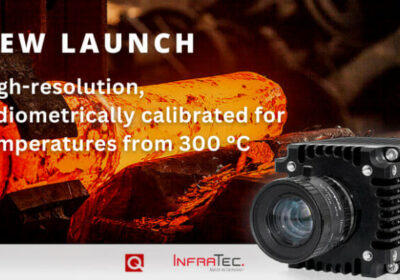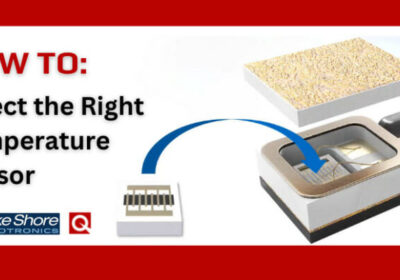Whether sauces, snacks or ready meals have to be filled and packaged, high throughput and quick format changes matter in the packaging systems and food industry – And to the highest standards of quality and hygiene, too. For this purpose, the sensors used have to be able to do one thing above all: meet high demands for power, flexibility and hygiene all at the same time. To do this, the packaging machine experts from SN Maschinenbau have rethought the entire concept of a bag-filling system used at notable companies in the food industry, tackled this subject innovatively and have opted for the smart camera technology from Leuze electronic for verifying codes and expiration dates.
Three tasks, one visualization
When developing the new FMH 80 forming, filling and sealing machine, the designers from SN Maschinenbau came up with a complete solution for various tasks using one single camera system. They scrutinized existing processes and principles and sought new, creative and flexible solutions. The objective was to make the monitoring of the expiration date economical on the one hand, and to identify reference codes on the other. With the latter function even being able to changeover automatically when products are changed. A third application using the same camera measures the position of the print mark on the packaging with the output of an actuation variable [mm] to a servo drive and adjusts the sealing stations of the vertical sealing seams in the process.
As a result, the pressure fluctuations on the packaging are automatically corrected.
The result is quite impressive: “An innovative design concept came out of this which provides the basis for a new generation of bag packaging machines,” states Thomas Berger, Head of Electric Development SN Maschinenbau, with satisfaction. With the new machine concept, an open, hygienic machine design with reduced component sizes was realized, which excludes hidden points and edges, thus enabling very simple cleaning. At the same time, increased customer requirements in terms of hygiene and allergy containment were able to be addressed. Every single element – from the safety concept to the visualization – was placed on the test bench and re-conceived.
Visualization and checking of reference codes
“The first task was the verification of reference codes,” explains Michael Fahr, a sales specialist at Leuze electronic for many years. The products and recipes programmed in to the machine are changed directly via the control, without any manual intervention from staff. “In addition, quality control to check the right contents are actually being filled in the right packaging intended for it must be provided every time,” adds Fahr. To this end, visualization optics are required which will read the reference codes and match them at the same time. Otherwise, customers could end up getting a carbonara sauce in the package displaying a picture of their favorite Bolognese! This is no longer merely something that could cause anger. Nowadays, with increasing levels of serious allergic reactions, it could potentially be fatal. The newly introduced visualization system now with the LSIS 462i is a camera-based technology. This becomes an absolute high-end solution in combination with the employed KRTM20 contrast sensor, which can save different contrast values of print marks on the packaging, which can be accessed directly from the control. “Such a convenient, and at the same time, economical solution had been in my mind for a long time. But up until now, I had not yet found a way to make this a reality,” says Thomas Berger. He is clearly delighted with this high-end model. In the past, either reference codes could be detected, which were depicted in the form of a bar code, or 2D-codes. “In order to be prepared for the future tasks of our customers, it is important to have a solution for bar codes, data matrix codes and QR codes simultaneously,” points out Berger. For this problem, too, Michael Fahr had the fitting solution for him with the smart camera, because the LSIS 462i is a multi-code-capable high-speed reader which can detect different types of reference codes. The check takes place while the packaging is moving at a speed of up to 4 m/s. Due to the strict hygiene conditions in the food industry, the LSIS 462i has been integrated into the new bag packaging machine also in a stainless steel protective housing with a high IP degree of protection, which does not compromise its detection capability in any way.
Checking expiration dates
Another challenge in this application is posed by checking the legibility of the expiration date labels. If expiration date codes were printed in poor quality in the past, the data was illegible due to misprints in the packaging system or the print was missing completely, such bags would only be able to be detected in this high-speed application with very expensive systems. By contrast, the new smart camera technology evaluates the expiration date labels on every single bag by means of several quality features – both at a standstill and when moving at up to 4 m/s. A second LSIS 462i detects the quality of each and every code in the same way and also performs a reference code comparison, so that the packaging actually contains what it proclaims. “Last but not least, clear legibility of the expiration dates is also down to the homogeneous lighting integrated into the LSIS 462i,” adds Michael Fahr. Due to its integrated, strong RGB LEDs, the new camera-based visualization optics are highly independent of ambient light and can be specifically adapted to every conceivable packaging design. Its focus can also be changed automatically in motor-driven fashion. It requires no mechanical intervention or even the opening of the camera by a member of staff. Changes to packaging characteristics can be conveniently stored in recipes and accessed with the machine recipe by the user.
Impressive all round – A complete solution
Jan Kronenberg and Thomas Berger agree that the complete solution impresses on every level: The stationary LSIS 462i from Leuze electronic employed in this application combines expertise garnered over several decades from the field of 1D-code reading with innovative smart camera technology. It reads bar codes, 1D-codes and 2D-codes reliably, both printed and directly marked. At the same time, it detects expiration dates. The measurement technology at the core of the smart camera can have the results of measurements incorporated into the process, or provide adjustment assistance for format changeovers by quickly finding the position of the print mark. The user is shown the directions of the necessary adjustments. Three tasks are thus fulfilled with just one camera model. Compared to OCR reading, this represents an efficient and cost-effective solution for high-speed applications. Due to its memory function, the KRTM20 contrast sensor can also save up to 128 contrast values at the same time. This means quick product changeovers, thus higher throughput is also possible in terms of print mark control. Owing to its integrated, homogeneous and highly ambient-light-independent LEDs, the LSIS 462i can be flexibly adjusted to the most diverse packaging designs. The smart camera can easily be integrated by means of a reproducible mechanical mounting bracket – designed by SN Maschinenbau. Reference code specification and program changes are provided directly from the control, without any manual intervention necessary. Mechanical intervention, or even opening the camera, is also not required when the focus has to be adjusted. Even this takes place fully automatically. An integrated display makes possible the diagnostics for the commissioning and alignment during operation directly on the device. The software, too, is directly contained within the smart camera. Configuration is performed directly via webConfig, meaning no separate configuration software is necessary. This Web-based software tool independent of the operating system simplifies commissioning enormously and saves on costs. Simple quality assurance and identification are therefore ensured by high-performance camera technology.
Participating companies
SN Maschinenbau GmbH, Wipperfürth
SN Maschinenbau GmbH, manufacturer of forming, filling and sealing machines, as well as FS rotary machines, has a wealth of tradition. Over five decades of experience, entrepreneurship and innovative strength have made SN Maschinenbau a global market leader for the manufacture and processing of sealed-rim and contour bags. The widest variety and consistency of products are packaged from the pharmaceutical, cosmetic, food and animal feed industries. Their customers include numerous market leaders of the industry, such as Unilever, Dr. Oetker, Kraft, Erasco, Nestlé and Dehner.
Leuze electronic GmbH + Co. KG, Owen
More than 50 years experience have made Leuze electronic real experts in innovative and efficient sensor solutions for industrial automation. Its main focus is on the areas of intralogistics, packaging industry, machine tools and automotive industry as well as laboratory automation. The product range includes switching and measuring sensors, identification systems, solutions for image processing and data transmission and also occupational safety components and systems. Leuze electronic was founded in 1963 at the current headquarters of the sensor system manufacturer in Owen/Teck, southern Germany. With its extensive international sales and service network, competent consulting and reliable customer service, Leuze electronic serves customers worldwide. More than 1200 sensor people at 22 locations are involved in development, production, sales and service – supported by more than 40 sales partners around the world. Every single day, each one of them delivers the Smart Sensor Business promise to their customers: to think easy, share experience, offer proximity and create the future.

